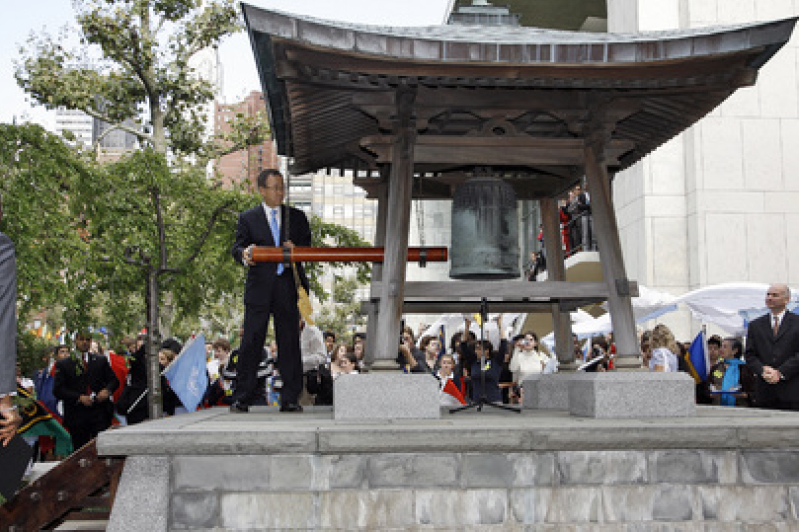
This last Sunday, while leaders from the United Nations celebrated the International Day of Peace, the religious leaders from the World Council of Churches and worldwide churches prayed and acted together to nurture lasting peace in the hearts of people, their families, communities, and societies.
On 21 September, UN Secretary-General Ban Ki-moon kicked off this year’s celebration of the Day at the traditional peace bell ringing ceremony in New York on Friday, which this year also marks the 60th anniversary since the adoption of the Universal Declaration of Human Rights.
During the event, Ban sent a text message for peace, as part of a UN campaign that urged cell phone users to compose peace messages to be published on a website and delivered to world leaders gathered for the General Assembly this week, according to United Nation’s report.
Ban’s text message read: “On 21 September, the International Day of Peace, I call on world leaders and peoples around the world to join forces against conflict, poverty and hunger, and for all human rights for all.”
“We know that human rights are essential to peace,” Ban said in his message to mark the Day, which is observed every year on 21 September.
“Yet too many people around the world still have their rights violated – especially during and after armed conflict. That is why we must ensure that the rights in the Declaration are a living reality – that they are known, understood and enjoyed by everyone, everywhere,” he stated.
Moreover, the Department of Public Information, focusing on the theme “Peace and Human Rights”, organized a student conference that invited more than 700 participants.
The Secretary-General called on the students to “use this chance to speak out about what concerns you most and think about your future and the future of this world.”
In addition, Ban added that today’s generation has powers of social networking that his generation can “hardly comprehend.”
“I use electronic communications all the time, but honestly – this is a little embarrassing – I have zero friends online. But you – collectively – can reach tens of thousands of people in an instant. You can mobilize way beyond your clique, beyond your community, even beyond the borders of your own country. That is the power you have and I count on it – your power to make this world different when you become leaders, and even before.”
The International Day of Peace was first established by the UN General Assembly in 1981 as a day of global ceasefire and non-violence. The Assembly called for people around the world to use the Day as an opportunity to promote the resolution of conflict and to observe a cessation of hostilities during it.
International Day of Prayer for Peace
Since a meeting between WCC general secretary Samuel Kobia and then UN secretary general Kofi Annan, the International Day of Prayer for Peace has been celebrated on September 21, coinciding with the UN International Day of Peace.
This year, the campaign for the day of prayer carried out by On Earth Peace, a US-based agency rooted in the Church of the Brethren, has mobilized nearly 140 congregations to hold public prayer events.
Furthermore, on the same day, nine countries from the Pacific, Europe, and North America regions were linked together in a 24-hour prayer chain. Prayer events were hosted by churches in America Samoa, Canada, Fiji, Indonesia, New Zealand, Norway, Samoa, Tuvalu and the United States.
The day of prayer is one of the initiatives of the WCC’s Decade to overcome violence (DOV).






